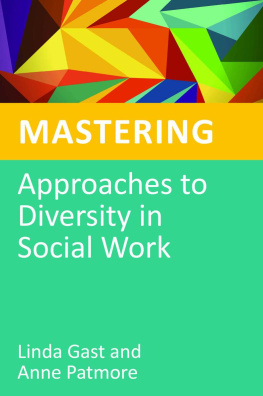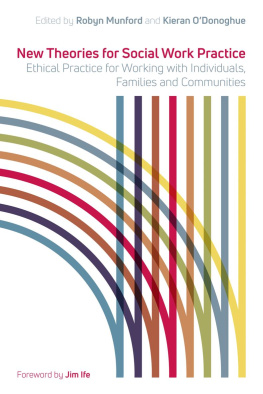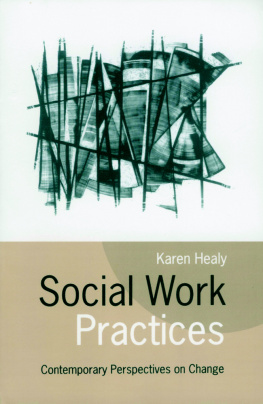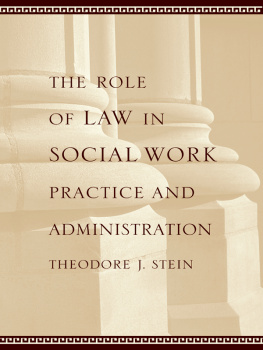Experiencing Social Work
Learning from Service Users
Mark Doel and Lesley Best
Mark Doel and Lesley Best 2008
First published 2008
Apart from any fair dealing for the purposes of research or private study, or criticism or review, as permitted under the Copyright, Designs and Patents Act, 1988, this publication may be reproduced, stored or transmitted in any form, or by any means, only with the prior permission in writing of the publishers, or in the case of reprographic reproduction, in accordance with the terms of licences issued by the Copyright Licensing Agency. Enquiries concerning reproduction outside those terms should be sent to the publishers.
| SAGE Publications Ltd
1 Olivers Yard
55 City Road
London EC1Y 1SP |
SAGE Publications Inc.
2455 Teller Road
Thousand Oaks, California 91320 |
SAGE Publications India Pvt Ltd
B 1/I 1 Mohan Cooperative Industrial Area
Mathura Road
New Delhi 110 044 |
SAGE Publications Asia-Pacific Pte Ltd
33 Pekin Street #02-01
Far East Square
Singapore 048763 |
Library of Congress Control Number: 2007932605
British Library Cataloguing in Publication data
A catalogue record for this book is available from the
British Library
ISBN 978-1-4129-1021-7
ISBN 978-1-4129-1022-4 (pbk)
Typeset by CEPHA Imaging Pvt. Ltd., Bangalore, India
Printed and bound in Great Britain by TJ International Ltd,
Padstow, Cornwall
Printed on paper from sustainable resources
To the memory of Mary Thomson
Contents
1 Introduction
I have to be frank, when I volunteered my story I was sceptical about what difference telling it could make. But now I am convinced
2 Learning from Humerah
When people see me they think physical disability, but actually its my mental health
3 Learning from Mandy
She gave space for me to talk about my situation from my point of view
4 Learning from Mrs Corbett
At one point she took over marvellously, but its OK because I feel in charge
5 Learning from Nina
Even in really bad rain shed come here to do the forms
6 Learning from Leone
You wouldnt have thought it was a childrens home it had a lounge, it had a dining room, the plates werent green
7 Learning from Julia
Id heard The day we picked you up from the social workers story, but never anything about the night that I was born
8 Learning from John
I instantly felt as though I was being listened to and that I had a chance of being seen as normal
9 Learning from Self-Advocates
Social workers are very much needed desperately
10 Learning from families: parents talking, children drawing
I thought social workers took children away, but they listen I dont think I would have got through the last two years without them
11 Learning from positive experiences: key themes
Then two years ago my social worker changed my relationship has changed beyond belief
12 From positive practices to a positive service
Nina muses that it is a matter of luck as to who [which social worker] you get
Preface
Why this book?
The social work library has grown enormously over the past few decades. From a slim Library of Social Work series in the early 1970s, most major publishing houses now have a large social work list, with book series and journals, too. Whether the focus is theory or skills, the legal framework or the social context, there is an extensive choice of literature. Not quite so well documented, however, are the specifics of the practice of social work. What do social workers actually do and how do they do it? Even rarer are accounts of how social work is experienced. As a relatively private encounter between two or more people, we have limited access to social work, and the accounts that are available are often mediated by academic researchers and aggregated into statistical rather than particular experiences. The combined picture of social work from all these sources, though valuable, is out of balance.
Some other perspectives are available. For example, practitioners recordings in case files and portfolios of practice are sometimes seen as part of the grey literature. However, these are rarely incorporated into academic referencing and because it is this latter evidence base which gives rise to most of the explicit theorising about social work, the voice of practitioners remains relatively weak.
Least heard are the voices of the people who experience social work directly, either as users of the services or as the carers of these people. There is evidence of increased service user and carer involvement in services (Carr, 2004) and the value of service user organisations informing future welfare policy (Beresford and Turner, 1997; Blueprint Project, 2004; Shaping Our Lives); however, accounts of the direct experiences of service users and carers remain unusual (Cree and Davis, 2007; Heriot and Polinger, 2002).
In the light of this, we have two imperatives. The one is to give greater voice to those who directly experience social work. By listening to the perspectives of these people, we challenge the nature of the knowledge that drives social work as an activity. We challenge the explanations about behaviours and beliefs that are so often steered by professional research and theorising, for we must not assume that the understandings of professionals and service users coincide (Napier and Fook, 2000).
The incorporation of service users accounts as equal partners in the pursuit of knowledge is a search for meaningful understanding rather than scientific explanation, and an acknowledgement that dependable scientific knowledge may well prove elusive (Taylor and White, 2000: 5.) It is an opportunity for the people who are too often the subjects of practice to provide a critique of that practice and for all of us to incorporate the learning from these critiques into our own practice. So, if the first imperative is to give voice to develop a better understanding of meaning, the second is to find ways in which these voices can be integrated into the more formal literature and to contribute to our theorising about social work.
Recounting positive experiences
Another factor which unbalances the picture of social work is the tendency to focus on social work when it fails. True, some proponents of social work have contributed to this by pathologising clients and focusing on ideas of inadequacy and dysfunction. Thankfully, there are methods of practice which redress this balance by harnessing peoples capabilities (Marsh and Doel, 2005; Pichot and Dolan, 2003), but the reality of practice can too often fall short of the rhetoric of the strengths model. This focus on what is wrong is reinforced by media that are searching for and selecting bad news and are often ideologically hostile to social work. The relative absence of a social work voice in the face of a hostile press is further highlighted by regular public inquiries into the tragic consequences of poor and dangerous practices. No doubt socio-biologists can explain why there seems to be something hardwired about the human propensity to select what is worng. We can safely assume, for example, that you focused on the word that was spelled wrongly in the previous sentence and not the twenty that were correct.










